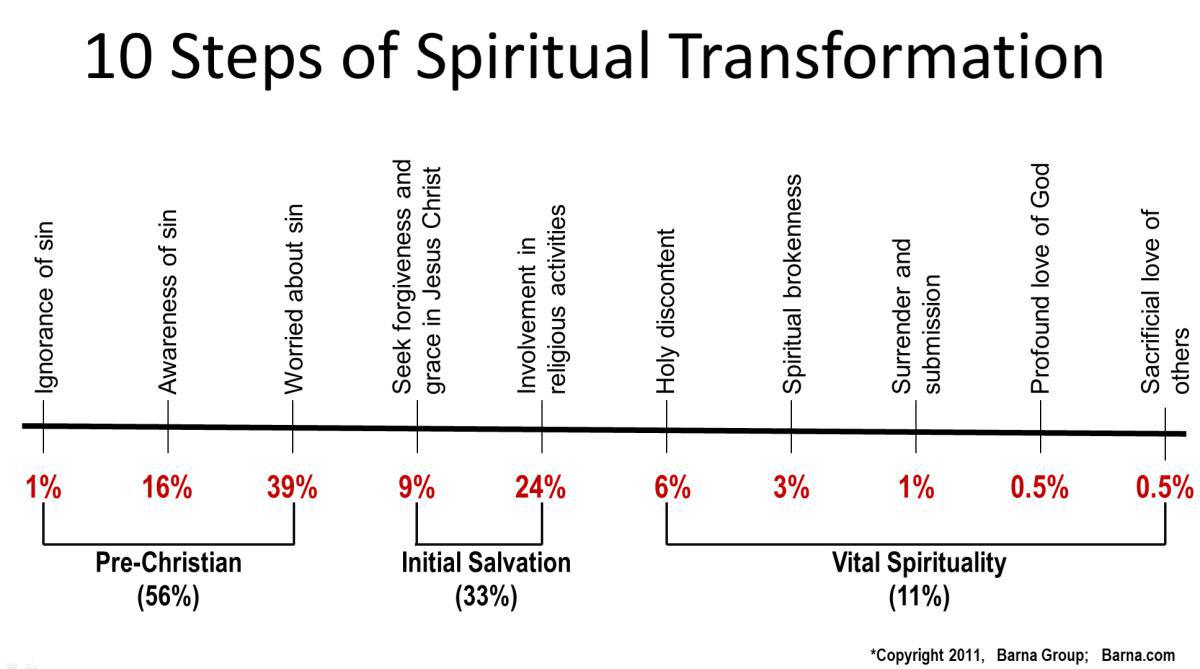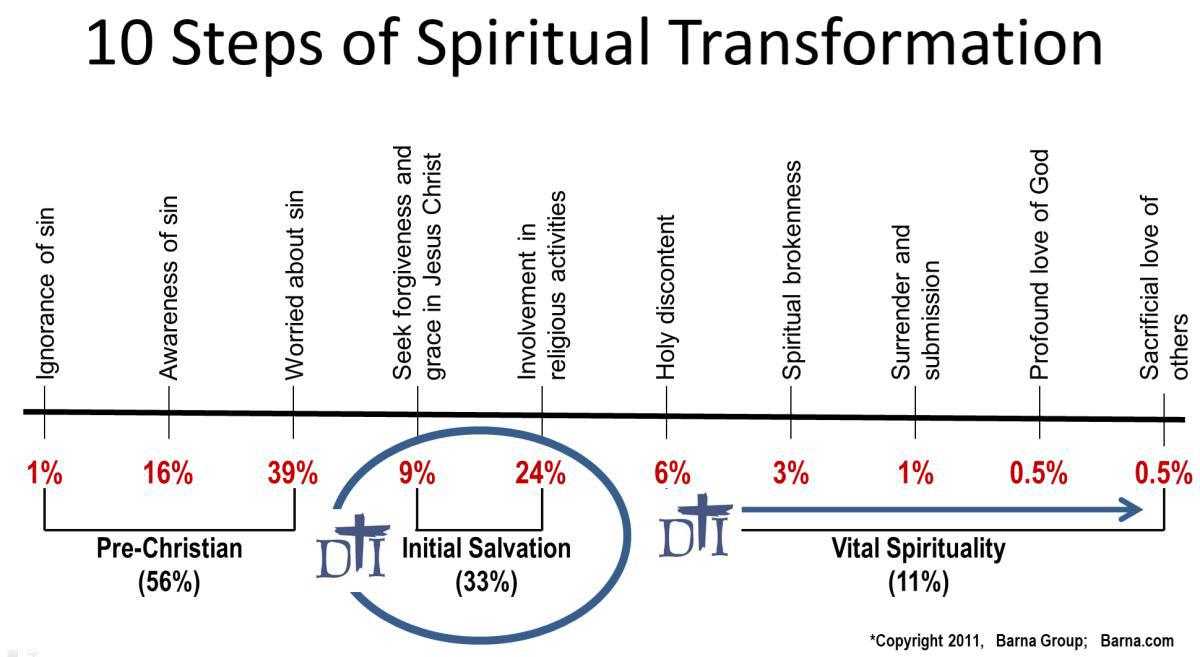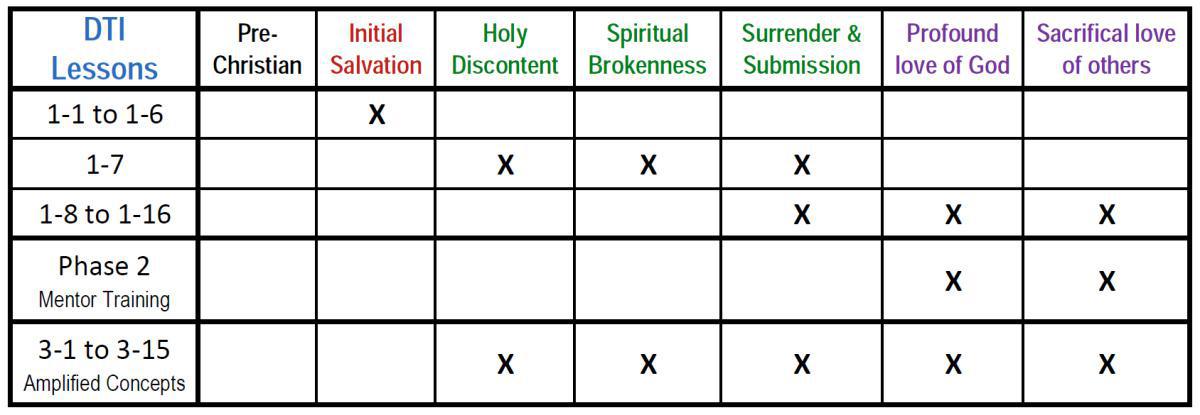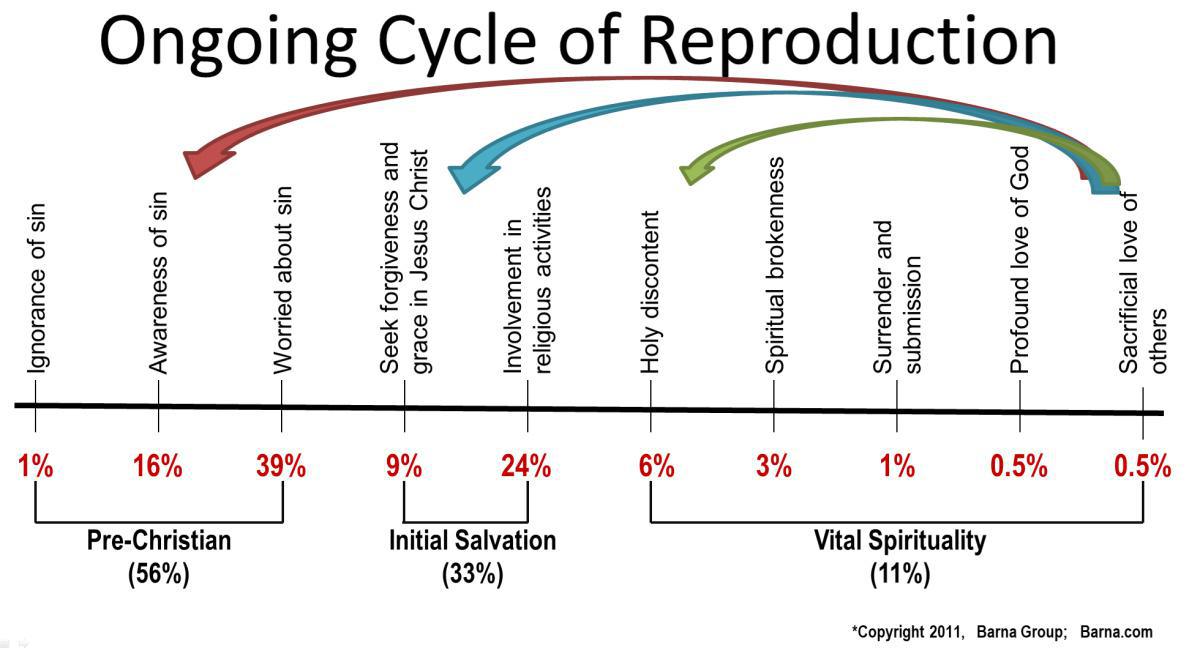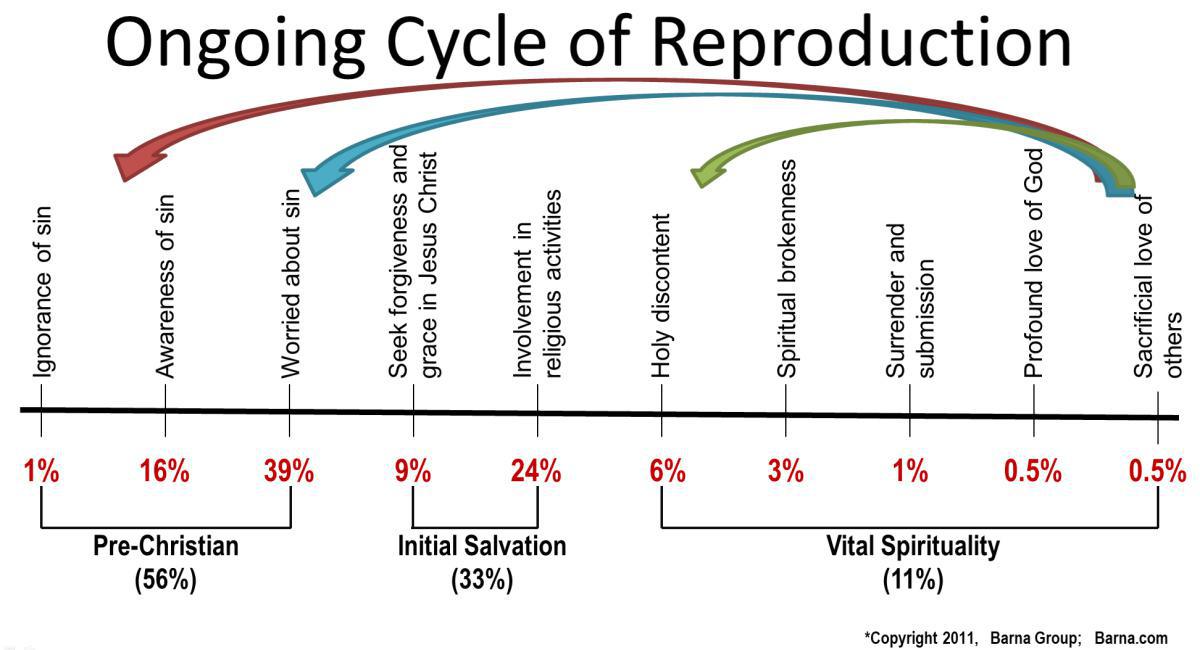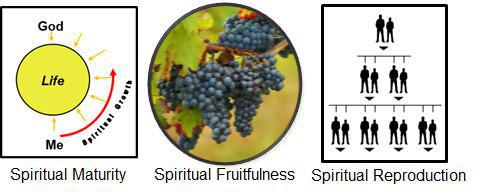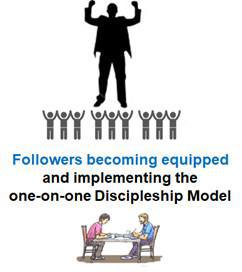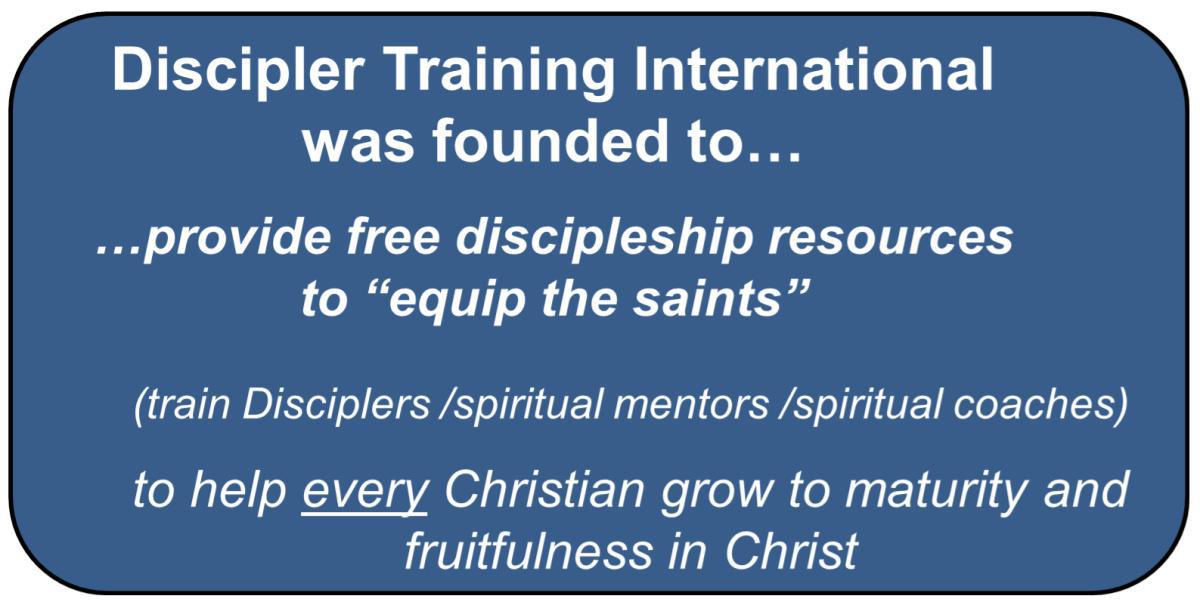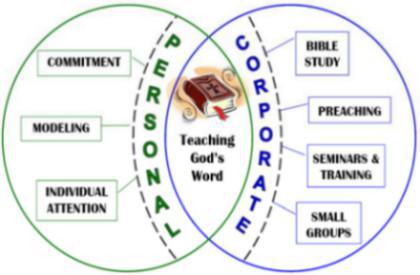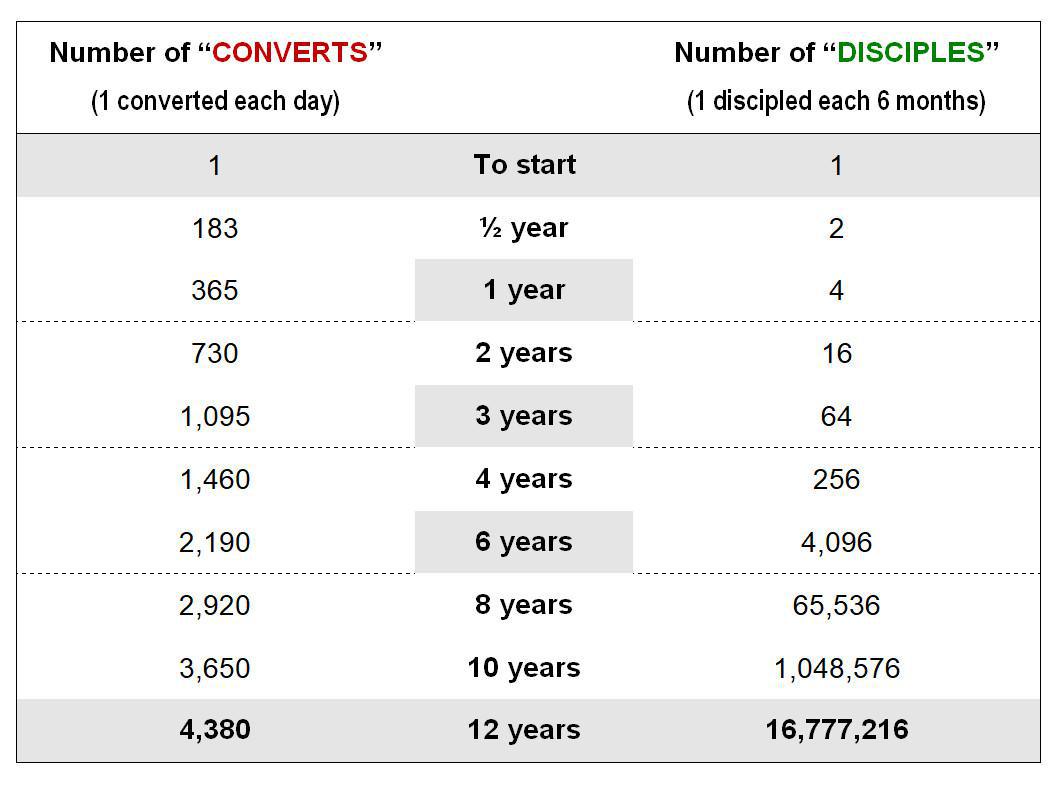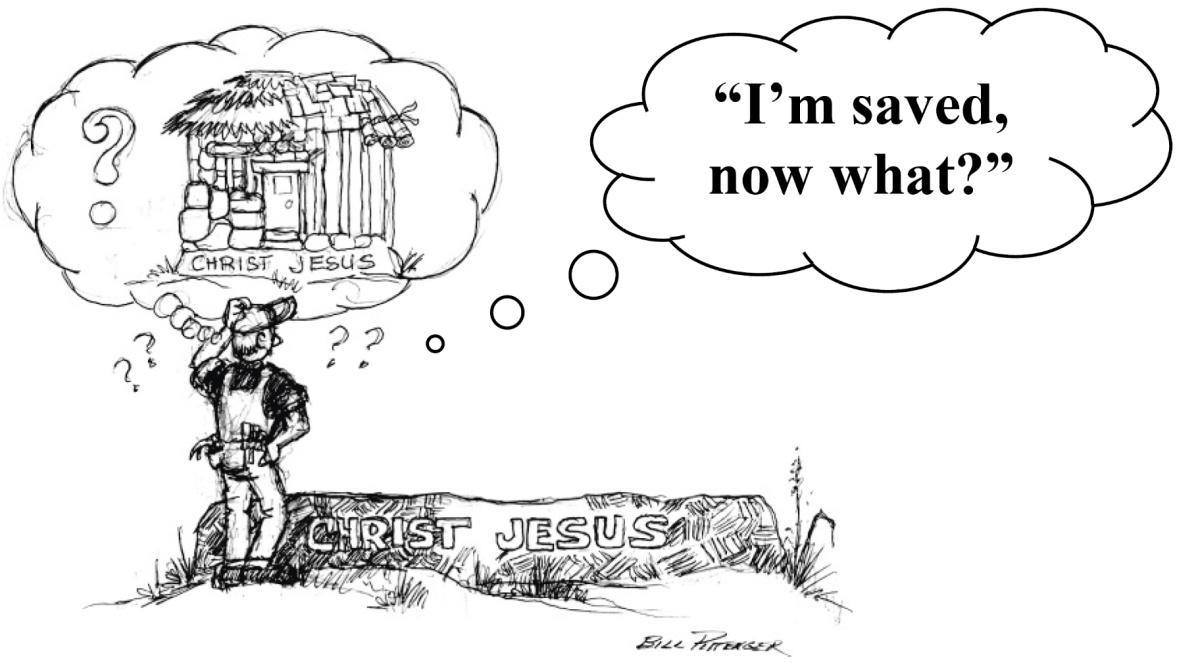THIS WAS THE ORIGINAL RD DOCUMENT. THE ONLINE DOCUMENT IS SEPARATED INTO 4 SEGMENTS.
INTRODUCTION
Many church leaders would agree that the body of Christ should be having a greater impact on the world. There are myriad reasons why the Church is not spiritually healthier. We will present what we believe are the major reasons for the prevalent spiritual weakness in the Body of Christ and offer solutions to reverse that trend.
Let’s begin with Jesus' words (often called “The Great Commission”)
Matthew 28:18-20 Then Jesus came to them and said, “All authority in heaven and on earth has been given to me. Therefore go and make disciples of all nations, baptizing them in the name of the Father and of the Son and of the Holy Spirit, and teaching them to obey everything I have commanded you. And surely I am with you always, to the very end of the age.” (NIV)
Do you think this was a SUGGESTION from Jesus – or a COMMAND? Let's listen to an expert in this field, Francis Chan.
If it is, indeed, a command, we should take it very seriously.
To fulfill Jesus’ mandate from these verses, we will discuss several questions:
-
What is the PURPOSE of discipling?
-
WHAT is a disciple?
-
What are the expected RESULTS or goals of “making disciples?”
-
HOW do we “make them” and "teach them to obey?"
Every disciple is a convert, but not every convert is a disciple.
1) What Is The Purpose Of Discipling?
Every person is born with a predisposition toward independence from God. That disposition tends to strengthen as the child grows into an adult.
Galatians 5:17 The sinful nature wants to do evil, which is just the opposite of what the Spirit wants. And the Spirit gives us desires that are the opposite of what the sinful nature desires. These two forces are constantly fighting each other, so you are not free to carry out your good intentions. (NLT)
When a person accepts His free gift of salvation, then God begins a process of inward transformation (sanctification). The pace and depth of that transformational process is affected by many factors, but can be accelerated by the openness of the new Christian.
Romans 12:1-2 …, brothers, by the mercies of God, I urge you to present your bodies as a living sacrifice, holy and pleasing to God; this is your spiritual worship. Do not be conformed to this age, but be transformed by the renewing of your mind, so that you may discern what is the good, pleasing, and perfect will of God.
The intent of discipleship (mentoring / “spiritual parenting”/ spiritual coaching) is to help the new believer to understand what God is doing in their life, in order to significantly influence and accelerate that process.
Colossians 1:28-29 (Paul wrote) We proclaim Him, warning and teaching everyone with all wisdom, so that we may present everyone mature in Christ. I labor for this, striving with His strength that works powerfully in me.
10 STEPS OF SPIRITUAL TRANSFORMATION
George Barna (of the Barna Group) in his book Maximum Faith: Live Like Jesus* details the results of a long-term research project, describing a ten-stop journey that produces robust life transformation and why most people struggle to pass the half-way mark. He observed that people are pretty random – not intentional – about their efforts to experience God-driven transformation. (Barna.com)
(Copyright 2011, published in association with the literary agency of Fedd and Company, Inc. 606 Flemingo Blvd, Austin, TX 78734, a joint publication of Metaformation Inc., Ventura, California; Strategenius Group LLC, New York, New York; and WHC Publishing, Glendora, California.)
In the chart below, we have adapted and summarized the “Ten Stops” data from Chapter 2.
In the video below Jeannette talks about a Barna study that details the results of a long-term research project, describing a ten-stop journey that produces robust life transformation and why most people struggle to pass the half-way mark. He observed that people are pretty random – not intentional – about their efforts to experience God-driven transformation. Jeannette will review the 10 Steps of Transformation to become more like Jesus, with excellent comments and insights.
After reading the study consider that we are struggling mightily with discipleship. Many churches are actually "lowering the bar" -- telling people it won't cost them to follow Jesus. But that's not what Jesus said! In Matthew 16:25, Jesus said, “If anyone wants to come with Me, he must deny himself, take up his cross, and follow Me.”
Discipleship must be focused on life transformation, not just joining a church. Note that in the Great Commission - Matthew 28:18-20 Jesus did not say just to “teach them”, but “teach them to obey.”
Barna says that these stops (or steps or waypoints) in our journey to wholeness can be used as a reasonable guide to help us stay focused on our growth and transformation to become more like Jesus and become spiritually mature. They are not necessarily linear, but more of an “ebb and flow” of steps forward and steps backward. And since each stop or step has an accompanying “price tag”, people sometimes go completely backwards and camp out there, rather than endure hardship or other suffering. They get comfortable in a less-demanding stop and settle for less than God’s best for them.
We also may allow God to transform us in several areas, Barna says, without letting Him completely transform all areas.
While there is so much wonderful content in George Barna’s book (and we recommend you read it and be challenged by the research findings), we want to focus on HOW can we help Christians progress? He gives some excellent insights…but what if we had a TOOL that would help believers continue their journey to the Vital Spirituality section?
The last three stops / steps / waypoints make up ONLY 2% OF ALL AMERICANS! That is very sad. And that is why Discipler Training International has developed A Tool For Personal Discipleship (available free to download in .pdf or as an App for mobile devices on our website).
If all new believers residing in “Initial Salvation” (the 33%) could each be spiritually mentored by a more mature believer who is farther along in their “Spiritual Vitality” (the 11%), the church would have a greater impact! How does this happen?
We need to help believers move along the steps of spiritual transformation and not park or plateau at any one waypoint! Then God will help them be willing to pour out time and energy into other believers who are not as far along in their faith. (Spiritually mentor them!)
This chart below shows where the DTI lessons in (A Tool For Personal Discipleship) most probably apply to help move Christians “to the right” along their spiritual journey towards “Sacrificial love of others.”
It is the believers who have a sacrificial love of others who will be witnessing to the Pre-Christians (56%) and discipling / spiritually mentoring the new believers (33%), so that more and more Christians are being transformed creating an ongoing cycle of reproduction .... where disciples are making disciples who make disciples, as Paul instructs his mentee Timothy:
2 Timothy 2:2 And what you have heard from me in the presence of many witnesses, commit to faithful men who will be able to teach others also.
2) What Is A Disciple?
We are all disciples of something (or someone). Are we disciples of Jesus? Are we being transformed from the inside out by our relationship with Him, becoming more like Him in our heart attitude and dependence on the Father, not just striving to ACT like Jesus in our own strength? Or are we adhering to the values and beliefs of the world around us, as depicted in Romans 12:2?
a) A Disciple of Jesus is not just a student, but an apprentice, a protégé.
A Student – Typically the goal of a student is to learn knowledge (information), that is, to learn what the teacher knows. The student may not even respect or like the teacher.
A Disciple – A disciple, on the other hand, is a student / apprentice who has the goal of becoming like the teacher. This requires personal interaction and commitment by the teacher (mentor, spiritual parent) to the apprentice learner / protégé.
Luke 6:40 (Jesus said) “A disciple (apprentice learner) is not above his teacher, but everyone who is fully trained will be like his teacher.”
Matthew 10:24-25 (Jesus said) “A disciple is not above his teacher, or a slave above his master. It is enough for a disciple to become like his teacher and a slave like his master.…”
A Student wants to know what the Teacher knows.
A Disciple wants to be LIKE the Teacher.
See also the article in the Appendix: “Characteristics of a Biblical Disciple”
b) Often in the Christian community the term “discipleship” has become synonymous with “teaching.”
To influence many people simultaneously appears efficient and is generally considered the method of choice by many leaders.
Thus, anyone who “teaches” is considered to be fulfilling the mandate to “make disciples.” And a believer who exhibits acceptable levels of Christian behavior is considered a disciple.
While one person speaking to many (while others just listen) appears efficient, we have found that a disciple (apprentice) must be given opportunities to express and discuss their unique needs and understanding and ask questions in order to mature more rapidly and fully.
What appears to be most efficient is not necessarily what is most effective.
Because many leaders measure success by numbers, this is one reason there is such an emphasis in the Christian community to hold events and activities, which gives the impression of short-term success, if attendance is the measure. But does it lead to sustained spiritual maturity?
c) The personal commitment (time) needed to make disciples seems prohibitive to many leaders and appears inefficient.
The teacher-disciple (mentor – protégé) model demands a greater commitment of time and resources, but we have found that it results in the greatest individual spiritual growth and impact.
There is deeper interaction between the discipler and the believer being discipled than that of simply teaching. While teaching is a crucial component of the discipleship process, when the mentor focuses on the disciple’s heart attitude, rather than just what the disciple “does” or “learns,” spiritual maturity is accelerated.
3) What Are The Expected Results or Goals of Making Disciples?
While knowledge is the result of learning, we submit that the anticipated results of discipleship should be:
- SPIRITUAL MATURITY
Colossians 1:28-29 (Paul wrote) We proclaim Him, warning and teaching everyone with all wisdom, so that we may present everyone mature in Christ. I labor for this, striving with His strength that works powerfully in me.
- SPIRITUAL FRUITFULNESS
John 15:8 (Jesus said) My Father is glorified by this: that you produce much fruit and prove to be My disciples.
- SPIRITUAL REPRODUCTION
2 Timothy 2:2 (Paul wrote) You have heard me teach things that have been confirmed by many reliable witnesses. Now teach these truths to other trustworthy people who will be able to pass them on to others.
As believers grow, we should see the transition from being a convert to becoming a Biblical Disciple of Jesus Christ, a believer being transformed into the image of Jesus.
In a spiritually healthy congregation spiritual reproduction should be observable and measurable, and everyone should be in the process of either being spiritually mentored or mentoring someone.
A measure of success is when the Believer being discipled becomes a functioning Discipler.
4) How Do We “Make Them” and "Teach Them To Obey?"
How do we help Christians become LIKE their master, Jesus? What’s the biggest challenge to this happening consistently in the local church?
THE CHALLENGE: Expectations in a Typical Modern Church Congregation
-
Followers usually feel they are not adequately qualified and equipped to meet the needs of new believers and often think it’s the Pastor’s / Leaders’ role.
-
Pastors / Leaders are often perceived to be “trained” to disciple others but don’t have the necessary time to devote individually to each new believer.
God designed the Church as a “Body”, intending that the members of the body be interdependent and share responsibilities and service initiated and directed by the Holy Spirit to accomplish His purposes.
1 Corinthians 12:28-31 Here are some of the parts God has appointed for the church: first are apostles, second are prophets, third are teachers, then those who do miracles, those who have the gift of healing, those who can help others, those who have the gift of leadership, those who speak in unknown languages. Are we all apostles? Are we all prophets? Are we all teachers? Do we all have the power to do miracles? Do we all have the gift of healing? Do we all have the ability to speak in unknown languages? Do we all have the ability to interpret unknown languages? Of course not! … (NLT)
"God never intended that a special category of believers (leadership) should carry the entire load, but rather the responsibilities of service should be spread across the Body.
If discipleship simply means “the presentation of biblical truth,” then leaders perceive that their responsibility is to preach that message, expecting each believer to allow the Holy Spirit to apply those truths to their own lives.
However, since most newer believers are unfamiliar with how to communicate and cooperate with the person of the Holy Spirit, they will flourish and mature more quickly if somone personally helps them understand how to cooperate with the Holy Spirit in their personal spiritual development.
In addition, many churches attempt to develop “teachers” rather than “disciplers” and to focus on those who seem to have the “gift” for teaching. Since teaching is a gift of the Spirit, we must conclude that not all will have that gift.
But discipling is not a gift. Therefore, while we should only expect a few believers to become teachers, almost all believers should be seen as potential disciplers.
The next challenge is that many churches convey that seminary or Bible school training is needed to present God's Word correctly. Certainly God has used such training in the spiritual development of many leaders, but does that mean that those who don’t have that training are not qualified at all? And is it realistic to expect the typical Christian to have such training before God can use them to come alongside others?
A SOLUTION: Implement a Better Model by Equipping ALL Faithful Believers
Ephesians 4:11-16 And He personally gave some to be apostles, some prophets, some evangelists, some pastors and teachers, for the training of the saints in the work of ministry, to build up the body of Christ, until we all reach unity in the faith and in the knowledge of God’s Son, growing into a mature man with a stature measured by Christ’s fullness .
Then we will no longer be little children, tossed by the waves and blown around by every wind of teaching, by human cunning with cleverness in the techniques of deceit. But speaking the truth in love, let us grow in every way into Him who is the head—Christ. From Him the whole body, fitted and knit together by every supporting ligament, promotes the growth of the body for building up itself in love by the proper working of each individual part.
These verses clearly state that the role of Leaders is to “equip the saints” (train them in the work of ministry). That would include discipling / spiritually mentoring others. This can be done in corporate training gatherings or modeled in intimate one-on-one relationships.
-
The role of the “saints” / followers is to have a surrendered attitude and learner’s disposition to continue to grow and to be trained to mentor others.
-
THE RESULT should be that personal discipleship / one-on-one mentoring is the norm rather than the exception. The expectation is that every believer is in the process of being discipled or discipling others.
The ultimate goal is spiritual maturity, spiritual fruitfulness, and spiritual reproduction of each believer individually, and of the Church body as a whole, which leads to church growth through multiplication.
The DTI Mission Statement is based on Colossians 1:28-29 where Paul states, We proclaim Him, warning and teaching everyone with all wisdom, so that we may present everyone mature in Christ. I labor for this, striving with His strength that works powerfully in me.
Paul’s passion was to help every believer to reach the level of spiritual maturity that God has intended.
CONSIDER the free resources DTI makes available for spiritually mentoring others on our website:
-
Core Resource: A Tool for Personal Discipleship can be used:
-
In a one-on-one mentoring relationship (or one-on-two)
-
In group study
-
For personal study and growth
-
In training faithful believers to mentor others, helping to identify gaps in spiritual understanding
-
-
How to access the Tool (curriculum)
-
Available to download and print in English, Spanish or Mandarin on our website. www.disciplers.org
-
Available as an App for mobile devices in English or Spanish on our website.
-
-
Plus videos, Implementation Guide, Facilitation Guide, and more.
If God’s intention is for believers to become spiritually mature, then why are so many believers immature?
W. Edwards Deming said “Every system is perfectly designed to get the results that it does.”
The above statement should motivate all church leaders to honestly analyze the system they are implementing, and look to the Lord for His wisdom and direction as to what changes need to be made in order to produce Biblical results. We suggest that many churches are not following the model Paul laid out in Ephesians 4:11-16.
What follows is a model churches can use to assist in implementing what Paul said, beginning with equipping faithful men and women to come alongside newer believers to help them grow
II. CONSIDER BALANCED DISCIPLESHIP
For Most Effectively Growing a Spiritually Healthy Church
Let’s consider what the typical church model for spiritual growth looks like, and how it can be improved for greater effectiveness.
Typical Church Model
The typical church has been successful in providing “Corporate Discipleship”, which is an essential element for healthy individual spiritual growth, as well as for healthy church growth
Corporate Discipleship includes:
- Teaching God’s Word
- Bible Study
- Preaching
- Conducting Seminars and Training
- Small Groups
These forms of discipleship will often be led by a believer who has the gift of teaching. Bible school or seminary training is helpful, but not essential.
Balanced Discipleship
The diagram below depicts what a Balanced Approach might look like, consisting of both “Corporate Discipleship” AND “Personal Discipleship”.
While the two types of discipleship have their unique roles, they complement each other.
Many churches are heavily weighted towards corporate discipleship, which often has the appearance of being more efficient, because one person can teach many.
Personal discipleship is generally more resource intensive (time, energy, finances), but we have found that it is more effective.
Many church leaders would like to be available to give each believer adequate individual attention, but that is usually impractical, due to their numerous other responsibilities, and lack of time.
Note that personal discipleship should be done by the “Body” – the equipped / trained believers working in cooperation with the leaders!
We have found that adding “Personal Discipleship,” will exponentially accelerate healthy spiritual growth.
The Four Components of Spiritual Parenting or Spiritual Mentoring
1) God’s Word:
“Teaching God's Word” is an essential component common to both the Corporate and the Personal side of all discipleship. God does not want the Bible to be seen simply as an academic text, but rather as a revelation of His character. The Bible is a means by which humans can “know” Him.
This is eternal life: that they may know You, … (John 17:3). The Holy Spirit’s guidance will always be in accordance with His Word.
Biblical truth is an essential component of Biblical discipleship.
A Christian cannot be spiritually mature without Biblical understanding, but a Christian may have much Biblical knowledge and yet not be spiritually mature.
1 Corinthians 8:1-2 … Knowledge inflates with pride, but love builds up. If anyone thinks he knows anything, he does not yet know it as he ought to know it.
Ephesians 4:11-16 … for the training of the saints in the work of ministry, to build up the body of Christ, until we all reach unity in the faith and in the knowledge of God’s Son, growing into a mature man with a stature measured by Christ’s fullness. Then we will no longer be little children, …
Colossians 1:28-29 We proclaim Him, warning and teaching everyone with all wisdom, so that we may present everyone mature in Christ.
1 Thessalonians 2:13 This is why we constantly thank God, because when you received the message about God that you heard from us, you welcomed it not as a human message, but as it truly is, the message of God, which also works effectively in you believers.
2) Commitment: The heart attitude of the discipler must be for the spiritual welfare and development of the disciple. A goal of the discipler should be to help the disciple to mature, function, be fruitful, and to spiritually reproduce. The benefits to the discipler are secondary.
This commitment goes beyond just presenting God's Word. Does the Discipler keep promises and confidences?
Paul’s concern for the believers went beyond that of just “a teacher.” He was committed to their spiritual welfare and growth.
2 Corinthians 11:28-29 … there is the daily pressure on me: my care for all the churches. Who is weak, and I am not weak? Who is made to stumble, and I do not burn with indignation?
2 Corinthians 2:4 For I wrote to you with many tears out of an extremely troubled and anguished heart—not that you should be hurt, but that you should know the abundant love I have for you.
2 Corinthians 12:15 I will most gladly spend and be spent for you.…
Colossians 1:28-29 … so that we may present everyone mature in Christ. I labor for this, striving with His strength that works powerfully in me.
2 Timothy 2:10 … I endure all things for the elect: …
3) Modeling: The goal is for the disciple to end up with the passion of the discipler, depending on the guidance of the Holy Spirit. The discipler is a model to the disciple in ways that go beyond just teaching. How do you teach patience, or faithfulness, or passion? These things are seen more than heard, and caught more than taught.
A discipler is a “model” (real, transparent) for the disciple. The goal is for the disciple to emulate the convictions and passion of the discipler.
1 Corinthians 11:1 Imitate me, as I also imitate Christ.
Philippians 3:17 (Paul to the Philippians) Join in imitating me, brothers, and observe those who live according to the example you have in us.
Philippians 4:9 Do what you have learned and received and heard and seen in me, and the God of peace will be with you.
1 Thessalonians 1:6-7 (Paul to the Thessalonian believers) And you became imitators of us and of the Lord when, in spite of severe persecution, you welcomed the message with joy from the Holy Spirit. As a result, you became an example to all the believers in Macedonia and Achaia.
Hebrews 13:7 Remember your leaders who have spoken God’s word to you. As you carefully observe the outcome of their lives, imitate their faith.
1 Timothy 4:12 (Paul to Timothy) … you should be an example to the believers in speech, in conduct, in love, in faith, in purity.
2 Timothy 3:10-11 But you have followed my teaching, conduct, purpose, faith, patience, love, and endurance, along with the persecutions and sufferings …
Luke 6:40 (Jesus said) A disciple (apprentice) is not above his teacher, but everyone who is fully trained will be like his teacher.
4) Individual Attention: The mentor should be prayerfully available to the Holy Spirit, to address the particular and specific needs of the disciple. That’s why the DTI material is designed with the intent of stimulating questions and conversation that will promote spiritual growth both in the discipler and the disciple. We are not just interested in academically presenting points 1, 2, 3, 4, 5. Each discipler will have unique and personal experiences that the Holy Spirit can recall and use in the discipling / mentoring process.
Notice what Paul states in 1 Thessalonians 2:7 … we were gentle among you, as a nursing mother nurtures her own children.”
Some believe that a new Christian is not in need of individual special attention. If the Holy Spirit had not led Paul to include the idea of nursing, it could be argued that this Scripture was referring to spiritual toddlers or even older spiritual children.
How soon after birth does a baby need to eat, be nursed? In the same way, how soon after getting saved, do we need to help “feed” the new Christian the Word of God? The enemy will be working on the new Christian immediately. We must be prepared to train them to depend on the Holy Spirit.
When a baby nurses, it is drawing nourishment through its mother. This normally continues until the child is weaned. The same is true with a baby Christian. The new believer often depends on the faith of the mentor until they learn to depend on the Holy Spirit.
“Until others learn to draw on the life of the Lord Jesus directly, they will have to draw on His life through you. You must literally be their source of supply, until they learn to take their nourishment from God.”
(Taken from My Utmost for His Highest by Oswald Chambers – Feb. 9 (c) l935 by Dodd Mead & Co., renewed (c) 1963 by the Oswald Chambers Publications Assn., Ltd., and is used by permission of Discovery House Publishers, Box 3566, Grand Rapids MI 4950l. All rights reserved.)
Paul recognized that every believer is unique and needs individual attention.
Often greater attention is focused on new believers who appear to show more potential, but God values and wants to use every believer for His purposes.
1 Samuel 16:7 But the Lord said to Samuel, “Do not look at his appearance or his stature, because I have rejected him. Man does not see what the Lord sees, for man sees what is visible, but the Lord sees the heart.”
Acts 20:31 (Paul to the elders of the church at Ephesus) Therefore be on the alert, remembering that night and day for three years I did not stop warning each one of you with tears.
Colossians 1:28-29 We proclaim Him, warning and teaching everyone with all wisdom, so that we may present everyone mature in Christ. I labor for this, striving with His strength that works powerfully in me.
1 Thessalonians 2:11-12 As you know, like a father with his own children, we encouraged, comforted, and implored each one of you …
There are inherent problems with believing that “presenting Biblical knowledge” equates to discipleship and that the other components are “optional.”
If the other three components on the Personal model are not given proper importance in the nurturing process, the Christian being mentored will typically have a difficult time growing to reproductive spiritual maturity.
-
If Biblical knowledge by itself is the key to spirituality, we should have the most spiritual generation of Christians in history, because Christian book stores are filled with books on every Biblical subject imaginable.
-
To propose that Biblical knowledge alone is the key to spirituality is like saying that food alone is the most important need of a child. Undeniably food is essential, but would it be accurate to convey to parents that love, commitment, nurturing, modeling, personal attention, etc., are somehow optional?
-
God has intentionally given us the process of raising a physical child as a model for raising a spiritual child. Think how a physical infant would fare if left to fend for itself, as the typical new spiritual child is!
-
Most Christians would agree that as the Holy Spirit draws unbelievers to Himself, He typically uses Christians somewhere in the birthing process. Just as a new baby needs parents, doesn’t a baby Christian need tending beyond just setting spiritual food on the table? Why would we think that the Holy Spirit now prefers to work alone (without using us) to help the new believer grow?
In many cases Personal Discipleship / Spiritual Mentoring is the missing ingredient for producing healthy spiritual growth.
Consider This Analogy:
A newborn child requires an extra amount of individual attention. As the child matures, guidance can increasingly take place in a group setting.
Since each child is unique, it should be expected that both group and personal attention would be needed on the road to maturity.
A newborn child requires an extra amount of individual attention. As the child matures, guidance can increasingly take place in a group setting.
Since each child is unique, it should be expected that both group and personal attention would be needed on the road to maturity.
When you bring a newborn baby home from the hospital, you don't just set them down and say, "Welcome to the family, Johnny. Make yourself at home. Your clothes are in your room upstairs; your diapers are in this drawer, and your milk is in the refrigerator.”
“We have just a couple of rules: No crying after 10 p.m. If you have any questions, there are lots of people in the family who would love to help you, so don't be afraid to ask. We will check on you again in about a week.”
You laugh and say that is ridiculous, but isn’t this what often happens to new Christians?
Someone gets saved and starts attending church services, but never gets much personal attention. We tell them, “Start reading your Bible (maybe the book of John) and pick out a small group - maybe one near your house. If you don't know what to do, just watch other believers, and don't hesitate to ask questions. Oh, and "welcome to the family. We'll see you next Sunday.”
We devote 18 years to raising our children, but don't even spend six months helping a new Christian get started in understanding the spiritual life.
As a result, many people have been Christians for many years, but have not grown very much.
Hebrews 5:12 refers to this phenomenon. Although by this time you ought to be teachers, you need someone to teach you the basic principles of God’s revelation again. You need milk, not solid food.
So, new believers need someone to give them guidance and help them grow.
(Above analogy is excerpted and adapted from http://bible.org/seriespage/stewardship-god’s-truth-through-discipleship
A BIBLICAL MODEL FOR PERSONAL DISCIPLESHIP
While “Personalized Discipleship” (Spiritual Parenting / Spiritual Mentoring / Spiritual Coaching) will accelerate spiritual growth, is there Biblical support for it?
Let’s consider the example of Personalized Discipleship found in 1 Thessalonians 2:3-13, where Paul clearly depicts himself as a “Spiritual Parent” (Spiritual Father and Mother), caring for his spiritual children. He lays out how a Spiritual Mentor (or parent) should relate to each spiritual child, or disciple. The human parallel is intentional and unmistakable.
(From Paul, with Silas and Timothy) 1 Thessalonians 2:3-13
THEY WERE SINGLE-MINDED IN PURPOSE
:3-6 … so we speak, not to please men, but rather God, who examines our hearts. For we never used flattering speech, as you know, or had greedy motives—God is our witness—and we didn’t seek glory from people, either from you or from others. Although we could have been a burden as Christ’s apostles, …
THEY CARED FOR THE BELIEVERS AS A MOTHER CARES FOR HER CHILDREN
:7-8 … instead we were gentle among you, as a nursing MOTHER nurtures her own children. We cared so much for you that we were pleased to share with you not only the gospel of God but also our own lives, because you had become dear to us.
THEY BECAME “ROLE MODELS” TO THE NEW BELIEVERS
:9-10 For you remember our labor and hardship, brothers. Working night and day so that we would not burden any of you, we preached God’s gospel to you. You are witnesses, and so is God, of how devoutly, righteously, and blamelessly we conducted ourselves with you believers.
THEY GAVE INDIVIDUAL ATTENTION AND INSTRUCTION AS A FATHER
:11-12 As you know, like a FATHER with his own children, we encouraged, comforted, and implored EACH ONE of you to walk worthy of God, who calls you into His own kingdom and glory.
THE WORD OF GOD WAS AN ESSENTIAL COMPONENT OF DISCIPLESHIP
:13 This is why we constantly thank God, because when you received the message about God that you heard from us, you welcomed it not as a human message, but as it truly is, the message of God, which also works effectively in you believers.
Too often believers are left to fend for themselves, with the apparent assumption that simply hearing biblical presentations and being in the presence of other believers will be sufficient.
Each new believer has unique spiritual needs that should be addressed during this initial formative stage and many new Christians would have experienced much more spiritual growth had someone given them adequate personal attention when they first accepted Christ as their Savior.
New believers will often come to correct conclusions if biblical truths are clearly presented in a personal setting where they can voice their questions and concerns.
The following Biblical timeline depicts the life of a Christian, resulting in accelerated spiritual growth.
1. Represents the “unsaved” period of time (spiritually dead to God) in a person’s life, from physical birth to spiritual birth. During this period “self-dependence” becomes a habit of everyday living, a way of life.
2. Represents the “Evangelism” stage, culminating in the event of salvation, at which time a person passes from being spiritually dead to being spiritually alive to God.
3. Represents the “Spiritual Mentoring” or Spiritual Parenting” stage, that is, the critical formative period of time in which a Christian needs a more mature believer to come alongside them, disciple them through the first steps of learning to increasingly live in dependence on the Holy Spirit. This will accelerate their growth toward spiritual maturity.
4. Represents the process of “Sanctification.” Having been personally discipled, the believer now has a basic understanding of the Master-servant relationship and the need to abide daily and follow the Holy Spirit, so as to continue being led and transformed by Him.
Jesus commanded us to make "disciples,” not just converts. In the Christian community there are many immature “converts,” but very few disciples.
Typically, there is a window of opportunity for new believers when they are usually hungry, and long for personal guidance, much like a new baby. There is a parallel between the spiritual development of a believer and the development of a baby. In both cases, the initial period is a formative stage. We believe this is why God chose to use spiritual terminology that parallels the human experience; such as “born again”, “baby”, etc.
The typical new believer is excited about having their sins forgiven and knowing that they're going to heaven. However, that enthusiasm should not be mistaken for spiritual understanding. New believers need clear instruction in order to understand how to recognize the Holy Spirit’s involvement in their life, and how to listen to, follow and obey Him. They also need to understand how to cooperate with Him in their own spiritual development.
Often believers, who are left to figure their Christian walk out on their own, end up simply imitating or copying the behavior of those who have been believers longer.
Have you ever made a copy of a copy of a copy? How much like the original are the later copies? This often happens with new believers who model their behavior by watching other Christians who have modeled their behavior after other Christians, and so forth. The focus becomes one of behavior modification rather than the heart attitude of Lordship / surrender and abiding.
We believe many new Christians would have experienced much more spiritual growth had someone given them adequate personal attention when they first accepted Christ as their Savior.
To know the Bible is good, but to intimately know and understand the One revealed BY the Bible is better!
Jeremiah 9:23-24 And This is what the Lord says: The wise man must not boast in his wisdom; the strong man must not boast in his strength; the wealthy man must not boast in his wealth. But the one who boasts should boast in this, that he understands and knows Me— that I am Yahweh, showing faithful love, justice, and righteousness on the earth, for I delight in these things.
John 17:3 This is eternal life: that they may know You, the only true God, and the One You have sent—Jesus Christ.
A goal of the discipler should be to help the disciple (apprentice learner) to mature, function, be fruitful, and to spiritually reproduce. The benefits to the discipler are secondary.
If personal discipleship / mentoring is needed and is effective in conjunction with corporate discipleship, why isn’t it woven into the fabric of most churches?
This is why we need to redefine “discipleship,” to include the personal component and equip all believers to make disciples who make disciples.
III. CONCLUSION and NEXT STEPS
We pray that we have presented a compelling argument for church pastors and leaders to seriously and prayerfully consider adding a personal component to your existing discipleship initiative.
If you do not have a systematic approach and strategy towards discipling believers, especially new believers, we pray you are motivated by the Holy Spirit to develop one, especially after reading that there is a biblical precedent for personal one-on-one spiritual mentoring.
Of course, we are not suggesting that you should discontinue what you are doing now, but consider adding the personal component to your corporate discipleship efforts. We have found, if given time and commitment, this will accelerate healthy spiritual growth.
Additional discussion points and topics follow the main segment of this document that you can use with your disciple-makers to help identify areas of spiritual need in your faith community, in order to prayerfully seek God’s solutions.
SUGGESTED NEXT STEPS:
-
Prayerfully discern which faithful men and women in your spiritual community already have a propensity to invest in the lives of others and review this content with them.
Ask them to prayerfully consider agreeing to become equipped to mentor others. -
Then as a group, go through the Phase 2 curriculum “Mentor Training” in our Tool For Personal Discipleship. (That will provide the mentors-to-be with training and answer questions about how to go about discipling another believer.)
- When Phase 2 training is completed, then go through Phase 1, Understanding The Christian Life, with the mentors. The 16 lessons are designed to be used in a facilitative style of question-and-answer, allowing the mentor to stimulate conversation. Please go through the lessons in order as each lesson builds on the previous one.
NOTE: From our website (www.disciplers.org) you can download the .pdf version and print it (or download the App for digital devices or computer)
For additional assistance in implementing an effective discipleship ministry in your congregation, review our Implementation Guidelines.
We remain available to answer your questions or consult with you as you develop your expanded discipleship strategy. Contact us at info@disciplers.org. We are praying for you!
APPENDIX: Additional Discussion Questions and Topics to be used with Disciple-Makers-to-Be
POTENTIAL CHURCH GROWTH THROUGH
SPIRITUAL MULTIPLICATION
(rather than just through addition)
God designed a system of multiplication whereby humans have populated the earth. A married couple incapable of having children is often viewed as sad, yet there is little surprise in many churches when believers are not spiritually reproducing or being involved in the spiritual growth of others / making disciples.
Consider that church growth through multiplication is much more productive over the long term than just addition. This is very important, because the seeming short-term ineffectiveness of personal discipleship has led many to the illusion that it really is not the best method.
The figures in the column on the left represent the number of converts if a Christian were able to win one person to Christ each and every day of the year. (addition)
The figures in the column on the right represent the number of fruitful disciples if each Christian was faithful during each 6-month period to mentor just one new convert to a level of spiritual maturity whereby that Christian could be used by the Lord, in turn, to mentor another convert. (multiplication)
At the beginning, the figures on the right are less impressive, because growth takes time. However, it has a much greater long-term benefit. Where should you spend the most energy?
2 Timothy 2:2 And what you (Timothy) have heard from me (Paul) in the presence of many witnesses, commit to faithful men who will be able to teach others also.
POINTS TO CONSIDER AND DISCUSS
1) Many times, a new believer (after accepting the gift of salvation by grace through Christ) is simply given a Bible and expected to effectively grow to spiritual maturity. Is that realistic?
While it is possible, we think it is the exception. Because some new believers appear to grow spiritually with little individual mentoring, wrong conclusions may be drawn.
We are tempted to ask, “Why can’t more Christians grow like that?” In the secular world there are those who excel without much help from others, but they are the exception.
For instance, we can hand a computer manual to 100 people who have no prior computer understanding. A few will manage, with difficulty, to eventually figure things out. But the vast majority will become frustrated and decide that a computer really isn’t worth all the hassle.
Many Christians left on their own, reach the same conclusion regarding the Christian life.
Which would you prefer: to be given a computer manual to learn on your own, or to have someone take the time to personally tutor you through the beginning phases and answer your questions?
We could truthfully state that the manual has all the knowledge you’ll need, and it is clearly presented.
If you were building a house but were inexperienced, how many people could do a decent job with just being handed the blueprints and instructions for building a house? Not many.
2) Can’t the Holy Spirit teach / mentor a new believer?
While the Holy Spirit is promised to teach us and help us understand, the Biblical analogy of a new believer being like a baby in 1 Thessalonians 2:3-13 shows us that they will develop more quickly and healthier with individual care.
The command to “make disciples” conveys much more than the idea of just handing someone a Biblical manual. The Holy Spirit expects older Christians to be available for His use in the process of spiritual coaching / mentoring / parenting, just as He wants them to be available as witnesses when He chooses to convict an unbeliever.
In this transition, your congregation becomes spiritually healthy, and spiritual reproduction should be observable and measurable, and everyone should be in the process of either being spiritually mentored or mentoring someone.
As believers grow spiritually, we should see the transition from simply being a convert to becoming a Biblical disciple of Jesus Christ.
3) Isn’t a Spiritual Gift needed to disciple?
MISCONCEPTION: There is a common misconception that the average Christian cannot effectively mentor another believer unless they are “spiritually gifted.” We don’t believe there is scriptural basis for that belief.
REALITY: Most Christians correctly believe that they should be available to the Lord to be a witness to the unsaved, even though there is not a “witnessing” gift. Likewise, there is not a “discipling” gift.
This misconception can be a convenient rationale to excuse the lack of discipleship. Church leadership ought to convey to congregations that every Christian should be available to the Holy Spirit as a witness and a spiritual mentor.
God has not intended for every believer to be gifted as an “evangelist”.
Ephesians 4:11 And He personally gave … some evangelists, …
But God has intended for every believer to be available to Him as a “witness” (not a spiritual gift.)
Matthew 5:16 In the same way, let your light shine before men, so that they may see your good works and give glory to your Father in heaven.
Acts 1:8 But you will receive power when the Holy Spirit has come on you, and you will be My witnesses …
1 Peter 3:15 but honor the Messiah as Lord in your hearts. Always be ready to give a defense to anyone who asks you for a reason for the hope that is in you.
God has not intended for every believer to be gifted as a “teacher”.
Ephesians 4:11 And He personally gave … some pastors and teachers
Romans 12:6-8 According to the grace given to us, we have different gifts: … if teaching, in teaching;
But God has intended for every believer to be available to Him as a “discipler / mentor” (that is, a “spiritual parent”), which is not a spiritual gift.
1 Thessalonians 2:7-13 … instead we were gentle among you, as a nursing mother nurtures her own children. … like a father with his own children, we encouraged, comforted, and implored each one of you …
John 12:24-26 I assure you: Unless a grain of wheat falls to the ground and dies, it remains by itself. But if it dies, it produces a large crop.…
Matthew 28:18-20 (Command to the Church) Go, therefore, and make disciples of all nations,
Both the command to be witnesses, as well as the command to make disciples, were given to the Church at large, not just to those who were physically present at the time. (Matthew 28:18-20 and Acts 1:8)
Every believer should be seen as a potential witness, as well as a potential discipler (“spiritual parent / spiritual mentor”).
4) Some reasons why Christians may be reluctant to make a commitment to personally mentor a new believer:
-
I don’t feel adequate
-
That’s not my gift
-
I don’t have enough Biblical understanding
-
I don’t want to be a hypocrite
-
I’m too busy, over committed
These reasons are usually based on the appraisal of their personal capabilities, rather than faith in God’s capabilities. Many Christians would greatly benefit from being equipped as spiritual mentors.
How many parents would have children if they had waited until they felt their parenting skills were adequate?
Have any of these reasons affected you either in the past or in the present?
Have you surrendered (Lordship) to His leadership?
Are you presently seeing God’s victory in your life?
5) Many churches don’t have an intentional process and expectation for spiritual mentoring. It often is not promoted and modeled by many older believers nor the pastors and church leaders.
The typical newer believer will imitate older believers who they look up to, or with whom they associate. Thus, every believer is a role model for other believers, even if they don’t want to be.
1 Peter 5:1-3 (leaders are told) … I exhort the elders among you: Shepherd God’s flock among you, … not lording it over those entrusted to you, but being examples to the flock.
Leadership cannot just tell people what to do, but rather, show them what to do. Can Christian leaders realistically expect followers to imitate what they themselves are not modeling (by example)?
6) The church community typically focuses on making converts rather than making disciples.
Jesus, in giving us the Great Commission (Matthew 28:19-20), said to go into all the world and make disciples, not just converts. This, then, brings up the need to distinguish between a “disciple” and a “non-disciple”. We believe it is true to say that not all believers are disciples, from the Biblical standpoint.
7) Biblical truth is often presented in isolated (topical) form, without a good understanding of how it fits into the Christian life as a whole. This leads to the believer’s life becoming compartmentalized.
Imagine watching a Power Point presentation of a project, a medical procedure, or someone’s family vacation. You would normally expect the presentation to begin with an objective or an overview, and then proceed in a progressive and sequential manner.
But what if the order of the presentation was random? The presenter would be able to explain each individual picture but would generally have difficulty presenting a progressive narrative. The more complicated the material and the greater the unfamiliarity of the viewer, the more difficult it would be to try to make sense out of the presentation.
Many times the Christian life is presented in a similar random order. Thus, the newer believer may have a difficult time trying to fit the isolated pieces together in a sensible way. That is why we recommend that the mentoring relationship begin with a visual overview, Lesson 1-1 (Overview of the Normal Christian Life), followed by a progressive and systematic arrangement of lessons in Phase 1 (Understanding the Christian Life), proven to help make disciples who are a reflection of Jesus and become disciples who make disciples.
ANALOGY: You don’t begin building a house by picking out curtains or putting on the roof. What do you have to do first?
-
Look at the plans – and lay the foundation.
-
Then you construct the house in the proper order by putting up the walls before you put on the roof - so it will be a sturdy building.
Likewise, the lessons in Phase 1 are intentionally designed to allow the Holy Spirit to form mature believers by beginning with foundational concepts of the Christian walk.
8) Why do children of believers often become resistant to the values of their parents?
We suspect that in many cases what the child sees modeled in the home has more impact than what the child is told. In other words, a parent may make declarations of Biblical values and convictions, but the child may not adopt those same stated values and convictions if there is not a consistency in the everyday living out of those values, if “the walk doesn’t match the talk.”
If I tell my child about the importance of living for eternity, but then demonstrate by my life that this temporary life on earth is of greater importance, which will they believe, my words or my life? It is relatively easy for a Christian to portray a consistent spiritual life to those with whom they only have short periods of contact each week (Sunday mornings), but it is very difficult to hide the real life values and convictions from children who are continually watching, and imitating.
Keep in mind, however, that children have free will – and the enemy will work on them. Pray for your children (and grandchildren) daily, as you walk out your journey of Lordship (surrender) and Abiding daily (living in constant fellowship with the Lord), allowing Him to continue His transformation of you. Children will be impacted. And we have His promise: Proverbs 22:6 Train up a child in the way he should go, And when he is old he will not depart from it. (NKJV)
SPIRITUAL FORMATION – HOW NEW BELIEVERS GROW SPIRITUALLY
1) How does a new believer acquire spiritual understanding?
If new believers are not instructed otherwise, they will typically appropriate the values and convictions of the Christians they associate with during the formative first period of their new spiritual life, just as children tend to adopt the values and convictions (worldview) of their families and peers.
Let’s say a new Christian begins meeting with a spiritually mature small group, who immediately begin to challenge the believer’s former values and convictions That believer is either going to adopt the worldview of this group, or he will become so uncomfortable that he will seek a more “friendly” and less intrusive and prohibitive environment.
But what happens if there is not such a group of mature Christians who will take the new believer under wing? Often, the newer believer will simply attend church services, assuming that “sitting under the preaching of the Word” will lead to a spiritually mature walk.
However, negative actions and traits he observes in some members of the congregation may distort the new believer’s understanding. We believe most new believers will be impacted more by what they “see” other believers do, than what they “hear” from the pulpit. Or they may develop a list of “do’s and don’ts” and focus on behavior rather than their relationship with God, often leading to compartmentalization of their life into “God’s part” and “my part.”
If the congregation is more spiritually mature, then perhaps the combination of “hearing” Biblical truth from a pastor/teacher, together with “seeing” Biblical spirituality modeled from members of the congregation, would be a tremendous help in the healthy spiritual growth of that new believer.
Realistically evaluate the spiritual health of your congregation, and ask yourself, “Do I want a new believer to become like the ‘typical’ member of our congregation?” If the answer is no, then consider implementing a method to impart Biblical values to new believers.
Example – Modeling affects how newer believers interpret the Bible. A woman attended a one-day workshop on Discipleship and the Christian life, and later shared with her husband some of what had been discussed. That caused him to take another look at the Great Commission in Matthew 28:18-20. He had always interpreted it as saying, “go and make converts”, but now realized that it indeed said, “go and make disciples”. He was surprised that he hadn’t been reading it correctly. How had this happened?
We believe what is emphasized or de-emphasized in teaching and preaching (for instance, by omission or neglect) will bias the listener’s interpretation of the Bible (especially an impressionable newer believer) as to what is important. This Christian had read the word “disciples” but substituted “converts” in his mind.
Ideally, we should be able to incorporate new believers into a congregation and have healthy spiritual growth with a Biblical worldview. Shouldn’t a new believer be able to assume that older Christians have it all figured out? Are you satisfied with the spiritual growth, values and convictions of your congregation? In many cases the answer is “no.”
When a newer believer is simply placed in the congregation without personal mentoring, that believer will naturally feel “free to adopt” whatever they choose to. We shouldn’t expect otherwise. Would I expect my child to acquire acceptable values and convictions if I allow him/her to associate with children whose values and convictions are unacceptable, yet I don’t object? By not saying anything to the contrary, I convey that their association meets my approval.
We should not expect the newer believer to understand initially much about the Christian walk. It is only natural for newer believers to be mainly concerned with doing the right things, which means their focus is on external behavior. As stated previously, a newer believer should be able to make the assumption that if he behaves like “older” Christians, then logically he’ll be behaving in an acceptable Biblical fashion, since those older Christians have “obviously” styled their behavior on Biblical patterns. Right? NOT!
Unfortunately, many older Christians have adopted their behavior from previous older Christians who they “assumed” to be spiritual. And so, one generation follows the next. Unwittingly, many Christian leaders are “conveying” approval of this natural human process, by not ensuring that each new believer is personally helped through the formative and critical period of the Christian walk.
While it is totally natural for new believers to begin their Christian walk focusing on “external behavior”, we believe it is God’s purpose for those believers to be transformed and quickly begin to focus on living by “Biblical principles.”
More than 90% of typical daily external behavior is not addressed specifically in the Bible. The typical Christian will not transition from focusing on external behavior to focusing on Biblical principles and depending on the Holy Spirit, unless another more mature Christian is willing to put the time and energy into helping them to understand God’s purposes and His process for producing spiritual growth.
2) Let’s look at several examples of adopting “external behavior” patterns:
How does a new believer evaluate the Biblically acceptable car to drive? Clearly it is not a question addressed specifically in a Bible verse. While the Bible doesn’t say, “thou shalt not drive a car valued at more than $100,000”, many Christians wouldn’t feel comfortable driving to church in a Rolls Royce. But who can find a verse that says it’s wrong? A new believer walking through the church parking lot cannot avoid noticing that most affluent believers drive more expensive vehicles and less affluent believers tend to drive less expensive vehicles -- just like the “real” world!
How about Biblically acceptable houses? Same as for cars. Most believers choose their houses using the same principles as unbelievers do. Unless a new believer is personally instructed to pray about the decision and apply Biblical values, why should we think they’ll come to any other conclusion than, “it must be okay, since older, wiser Christians have made that determination. They know the Bible better than I do. I’m just a new believer, what do I know?”
How about Biblically acceptable eating behaviors? How obese is obese? Is it normal to be 19% over normal? How about 20% over normal? Who decides what is "normal?" If there are so many overweight believers (just like in the world), then obviously the new believer has to assume that Bible verses referring to eating were really meant for believers in a different era, since the subject is seldom addressed in most congregations.
What about smoking, drinking alcohol, wasting time, excessive working, neglect of spouses and family, financial investment in possessions, the stock market, …and the list goes on. If the new believer is allowed to continue focusing on outward external behavior, rather than on Biblical principles or asking guidance from the Holy Spirit, there is a high probability that the believer will grow into a “self-dependent” and “worldly-minded” Christian, practicing an externally acceptable spiritual life on the one hand (acceptable to Christian peers), while at the same time pursuing worldly goals of possessions, pleasures, power and popularity (to the extent they’re not offensive to Christian peers).
3.) What do we mean by the terms “self-dependent” and “worldly-minded?”
In the Bible we see a contrast between “God-dependent believers” and “self-dependent believers.” This, we believe, is the contrast brought out in Proverbs 3:5-6, Trust in the Lord with all your heart, and lean not on your own understanding; in all your ways acknowledge Him, and He shall direct your paths. (NKJV)
We also want to distinguish between “disposition” and “acts of behavior”. What we “do” is an expression of what we “are.” See the two examples below.
1. Example: King David and King Saul
(for a deeper discussion go to Lesson 3-3)
King David was described by God as a “God-dependent believer” (referring to the disposition of his heart).
Acts 13:22 – After removing Saul, He made David their king. God testified concerning him: ‘I have found David son of Jesse, a man after My own heart; he will do everything I want him to do.’(NIV)
But nobody would suggest that David's behavior was pleasing to God when he committed adultery and murder.
On the other hand, King Saul’s heart disposition was characterized by a pattern of “self-dependence.” As a result, when faced with decisions related to behavior, King Saul consistently “leaned on his own human understanding”, rather than walking by faith in God’s leading.
I Samuel 15:10-11 Then the word of the Lord came to Samuel, “I regret that I made Saul king, for he has turned away from following Me and has not carried out My instructions.”
It is important to note that God-dependent believers do not always trust God in every situation, and self-dependent believers often call upon the Lord in times of distress and crisis.
2. Example: Joshua and Caleb
(for a deeper discussion go to Lesson 3-4)
There is a clear contrast between Joshua and Caleb and the other ten Israelite tribal leaders. All were sent by God to survey the Promised Land. All twelve men saw the same things, but only two men, Joshua and Caleb, had a “faithful” heart disposition that led them to trust God’s promise. The other ten had a disposition of trusting in their own human reasoning, which led them to forfeit God’s intended blessings.
Joshua 14:7-8 (Caleb relates) I was forty years old when Moses the servant of the Lord sent me from Kadesh Barnea to explore the land. And I brought him back a report according to my convictions, but my fellow Israelites who went up with me made the hearts of the people melt in fear. I, however, followed the Lord my God wholeheartedly. (NIV)’
Numbers 14:24 God says of Caleb, …But because My servant Caleb has a different spirit and follows Me wholeheartedly, I will bring him into the land he went to, and his descendants will inherit it. (NIV)’
In the DTI discipleship materials, we use the terms “God-dependent” or “spiritual” to describe believers who have chosen to acknowledge God as the One who can best oversee and manage their lives, and who view themselves as “servants of God their Master” (Lordship).
We use the terms “self-dependent” and “worldly-minded” to describe believers who have either willingly, or ignorantly, not chosen to acknowledge and accept the authority and Lordship of Christ over their life.
Unfortunately, we believe the Biblical concept of “self-dependence” would characterize many believers in the American evangelical Christian community today. What about your church?
Again, we want to clarify that the terms “God-dependent” and “self-dependent” apply to “heart attitude” (disposition) rather than to “external behavior.” If we convey that the Christian walk is mainly about rules, we will be unconsciously promoting the misconception of focusing on external behavior, rather than the Biblical concept of focusing on the “internal transformation,” from which external behavior is derived.
Romans 12:1-2 Therefore, brothers, by the mercies of God, I urge you to present your bodies as a living sacrifice, holy and pleasing to God; this is your spiritual worship. Do not be conformed to this age, but be transformed by the renewing of your mind, so that you may discern what is the good, pleasing, and perfect will of God.
Matthew 12:34 … For the mouth speaks from the overflow of the heart.
ADDITIONAL DISCUSSION QUESTIONS AND TOPICS
1. DTI’s desire is to present the concept of discipleship as a commitment to spiritually mentor or “spiritually parent” a disciple-in-the-making, in contrast to the prevalent idea that discipleship is simply a “transfer of Biblical knowledge” that takes place, usually in a classroom or group setting. We believe that group meetings do play an important part in healthy Christian growth, but they should not take the place of personal one-on-one mentoring, which includes individualized teaching, modeling, encouragement, exhortation, etc.
What are the advantages and disadvantages of corporate meetings such as a classroom setting, or a small accountability group, and the advantages and disadvantages of one-on-one meetings?
What is the importance of each of the four major components of personal discipleship? Why is the initial period in a new Christian’s life so important for spiritual development?
2. How have I been personally impacted by the modeling of other Christians? Has it had a positive or negative impact on my life?
3. If someone were to ask me to describe a “biblical disciple”, how would I respond?
4. Do I see new believers as “spiritual babies” in Christ? Wouldn’t it seem logical to look at the characteristics of a typical human baby and compare them to new believers? Consider these three notable traits. Are there others?
1) They’re hungry
2) They’re dependent on others
3) They are self-centered.
5. Often new believers are not presented with essential spiritual concepts because there is a fear of overwhelming them with too much complex Biblical information, concluding that the Christian life can really only be understood by advanced believers.
None of the spiritual concepts presented in the DTI discipleship curriculum are overwhelming if prayerfully and clearly explained. However, if left on their own, many newer Christians will conclude that God’s provision for a healthy Christian life is totally dependent on their outward obedient behavior and/or Biblical knowledge and understanding. That is overwhelming.
6. The excitement commonly observed in a new Christian’s life is often mistakenly taken to indicate a measure of spiritual understanding. They hear that they are “new creatures in Christ,” yet soon find themselves with temptations similar to what they experienced as unbelievers.
Is it any wonder that so many Christians find themselves living like unbelievers after a few months of striving to live the “new” life that seems to be expected of them, in their own strength? Many continue to attend church services, and may be involved in Christian events and programs, but inwardly are defeated and struggling, “doing their best!” Does this resemble your personal experience in any way?
7. Personal discipleship serves to acquaint the newer believer with the general goals that God has for their life and with the process by which God typically accomplishes spiritual growth. Because each Christian is unique, only the Holy Spirit can be in charge of the spiritual growth process. Through personal discipleship, our intent is to shorten the time required for the newer believer to learn how to cooperate with the Holy Spirit in the process of spiritual growth. What should be the anticipated spiritual results of healthy discipleship? Why?
8. Ideally every new Christian should be individually mentored in order to help them in the transition from self-reliance to an increasing God-reliance, as clearly contrasted in Proverbs 3:5-6 ‘Trust in the Lord with all your heart, and lean not on your own understanding; in all your ways acknowledge Him, and He shall direct your paths.’ (NKJV)
Sadly, older Christians, who have not yet acknowledged His Lordship, will often be resistant to changes, since they typically will have become accustomed to a somewhat manageable Christian lifestyle.
Persecution and crisis are instruments that God uses to accelerate the transition to God-reliance.
Am I alert for Christians who have recently passed through a crisis and are now ready to acknowledge His Lordship over their life?
It is the Holy Spirit’s role to coordinate crisis, and my responsibility is to be available to Him when He wants to use me in the life of another who is responding to Him.
9. Do I know what spiritual gift (or gifts) I have been given by the Holy Spirit? If so, how did I come to this conclusion? Is it from observing the Lord’s involvement in my life? How has He been using me to spiritually benefit others? Has anyone else commented to me regarding my spiritual “giftedness?)
CHARACTERISTICS OF A BIBLICAL DISCIPLE
1) A pivotal issue that I must deal with is Christ’s lordship over my life.
In other words, I have considered the claims of Christ, and have concluded that the best workable relationship is for the Lord to be in charge of my entire life. One of Christ’s claims is that of ownership (having authority over that which is owned).
1 Corinthians 6:19-20 Don’t you know that your body is a sanctuary of the Holy Spirit who is in you, whom you have from God? You are not your own, for you were bought at a price. Therefore glorify God in your body.
1 Corinthians 7:23 You were bought at a price; do not become slaves of men.
God’s ownership of me is a factual truth, which is not dependent on my acknowledgment of it. I do not bestow ownership, I can only acknowledge and act upon what He states to be already true.
New believers will typically not be resistant to this truth, because they don’t have preconceived ideas of God’s expectations. In contrast, older believers tend to accept this truth intellectually, but be resistant to the implications. What are the implications of ownership? What rights or authority are generally conveyed by ownership? Does an owner have the right to do whatever he wants with his property?
He Owns Me (Whether I Believe It or Not). His Ownership is Not Dependent on My Acceptance
It (being a disciple) involved personal allegiance to Him, expressed in following Him and giving Him an exclusive loyalty. In at least some cases it meant literal abandonment of home, business ties and possessions, but in every case readiness to put the claims of Jesus first, whatever the cost, was demanded. Such an attitude went well beyond the normal pupil-teacher relationship and gave the word ‘disciple’ a new sense. (The New Bible Dictionary)
2) A Biblical disciple has reconciled Christ’s command for His followers to accept a Master-servant relationship with Him.
Luke 14:25-33 Now great crowds were traveling with Him. So He turned and said to them: “If anyone comes to Me and does not hate his own father and mother, wife and children, brothers and sisters—yes, and even his own life—he cannot be My disciple. Whoever does not bear his own cross and come after Me cannot be My disciple. … In the same way, therefore, every one of you who does not say good-bye to all his possessions cannot be My disciple.
NOTE ON LUKE 14:25-33 The stress here is on the priority of love. (Compare Matthew 10:37 The person who loves father or mother more than Me is not worthy of Me; the person who loves son or daughter more than Me is not worthy of Me.”)
Romans. 6:19 … so now offer them (members of our physical body) as slaves to righteousness, which results in sanctification.
1 Corinthians 7:22 … he who is called as a free man is Christ’s slave.
1 Peter 2:16 As God’s slaves, live as free people, but don’t use your freedom as a way to conceal evil.
One’s loyalty to Jesus must come before his loyalty to his family or even to life itself. Indeed, those who did follow Jesus against their families’ desires were probably thought of as hating their families.
(Walvoord, John F., and Zuck, Roy B., The Bible Knowledge Commentary, (Wheaton, Ill: Scripture Press Pub., Inc.)
3) A disciple has a desire to know God, not just know “about” Him.
Jeremiah 9:23-24 This is what the LORD says: … But the one who boasts should boast in this, that he understands and knows Me—that I am Yahweh, showing faithful love, justice, and righteousness on the earth, for I delight in these things. This is the LORD’s declaration.
Luke 10:38-42 … He (Jesus) entered a village, and a woman named Martha welcomed Him into her home. She had a sister named Mary, who also sat at the Lord’s feet and was listening to what He said. But Martha was distracted by her many tasks, and she came up and asked, “Lord, don’t You care that my sister has left me to serve alone? So tell her to give me a hand.” The Lord answered her, “Martha, Martha, you are worried and upset about many things, but one thing is necessary. Mary has made the right choice, and it will not be taken away from her.”
John 17:3 This is eternal life: that they may know You, the only true God, and the One You have sent—Jesus Christ.
Romans 12:2 Do not be conformed to this age, but be transformed by the renewing of your mind, so that you may discern what is the good, pleasing, and perfect will of God.
4) A disciple has the attitude of one who follows the Lord, not one who “leads” the Lord.
Luke 5:10-11 … “Don’t be afraid,” Jesus told Simon. “From now on you will be catching people!” Then they brought the boats to land, left everything, and followed Him.
Luke 9:23-24 Then He said to them all, “If anyone wants to come with Me, he must deny himself, take up his cross daily, and follow Me. For whoever wants to save his life will lose it, but whoever loses his life because of Me will save it.”
John 12:24-26 “I assure you: Unless a grain of wheat falls to the ground and dies, it remains by itself. But if it dies, it produces a large crop. The one who loves his life will lose it, and the one who hates his life in this world will keep it for eternal life. If anyone serves Me, he must follow Me. Where I am, there My servant also will be. If anyone serves Me, the Father will honor him.”
These four characteristics of a Biblical Disciple should not imply that as a disciple of Jesus I’m “super spiritual” or beyond the capacity to sin.
Although my acceptance of Christ’s yoke gives the Holy Spirit the freedom to mold me, I still have the capacity to disobey, and can submit to my sinful human nature for varying lengths of time.
When I make the choice to acknowledge the Lordship of Christ over my life it has set the general direction of my Christian life. The everyday application of assimilated convictions will depend on my continual willingness to yield up areas of my life to His authority. The battle has been won, but there are many skirmishes.
Caution: I can find myself in a quagmire of defeat if I do not understand how to consistently abide in fellowship with the Lord. (See Lesson 1-9)
One of the responsibilities of Church leadership is to convey to the congregation that each believer should aspire to be used by the Holy Spirit as a “witness,” and also as a “discipler” (spiritual parent or mentor)
Acts 13:22 … He (God) raised up David as their king and testified about him: ‘I have found David the son of Jesse, a man loyal to Me, who will carry out all My will.
.


